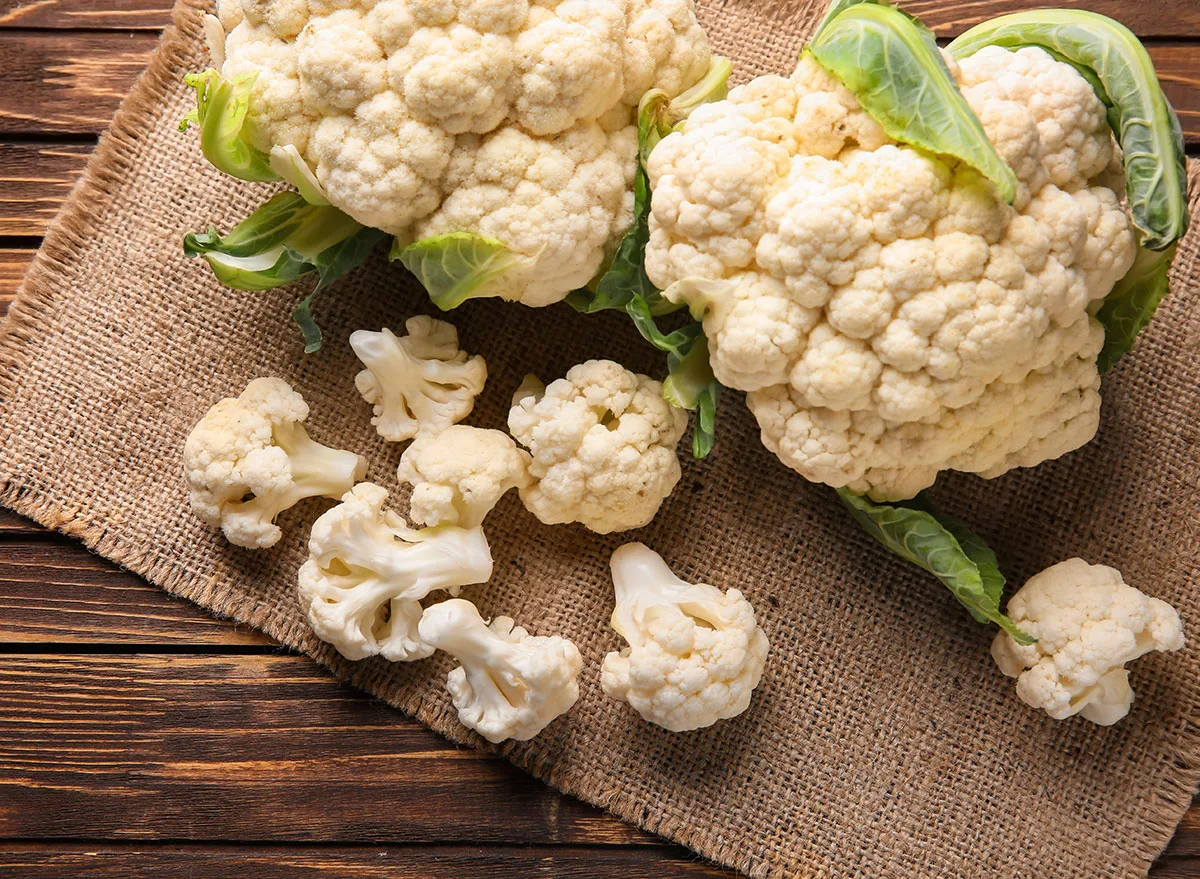Cauliflower is a type of cruciferous vegetable high in B vitamins and fiber. It gives phytonutrients and antioxidants that will protect you against cancer. Cauliflower has fiber to improve digestion and weight loss, choline is essential for memory and learning, and various other essential nutrients.
One cup of cauliflower provides:
- Around 20% of dietary vitamin K requirements
- Over 80% of vitamin C dietary requirements.
- 10% of folate and vitamin B6 requirements.
The important compound present in cauliflower vegetables is sulforaphane which will help to fight cancer and increase heart health in many different ways. Anti-inflammatory compounds present in this veggie keep your inflammation in check & prevent other related diseases.
Cauli is highly rich in other minerals and vitamins that help to boost your brain health and offer various digestive advantages. Well, there is more to this wonderful vegetable. Let us check out some pros and cons of eating cauliflower.

Cauliflower Pros
Better For Your Heart Health
One of the studies shows that cauliflower is rich in fiber that will improve heart health. Cauliflower has sulforaphane which is known for improving blood pressure significantly. This veggie has omega-3 acids that help to regulate levels of cholesterol and also prevent cardiac disease.
Good for Your Digestive Health
Just like other foods with a higher amount of dietary fiber, cauliflower is best for digestive health. We all know fiber helps in the functioning of the digestive tract and adds bulk to stool making it simple to pass from your system. It helps to prevent cases of diarrhea and constipation.
Improves Brain Function
Another important nutrient present in cauliflower is choline. It is a kind of B vitamin, which plays an important role in your brain development and health. The presence of choline in this veggie can prevent memory decline. It will also help to deal with various nervous disorders such as Alzheimer’s.
Cauliflower Has Antioxidants
Free radicals are quite unhealthy elements that are produced during various processes in our body. The free radicals will react with the healthy cells in your body as well as damage them in this process.
Here’s where antioxidants will come into the picture. Antioxidants make sure that the free radicals are neutralized in your body. They make sure our body’s defense system gets very active.
Our cells become more resistant to dangerous toxins like infections, free radicals, and other hazardous pathogens.
Fights Off Cancer Causing Cells
Cauliflower has plenty of glucosinolates, a kind of sulfur compound (it is responsible for the strong sulfur smell, that cauliflower has when cooked) & thiocyanates that are good for fighting cancers. These compounds will kill off the cancer cells as well as slow down tumor growth.
Besides cauliflower helps in the prevention of breast cancer, prostate cancer, colorectal cancer, lung cancer, and stomach cancer. The studies show it has the potential in fighting bladder cancer, but the studies are inconclusive.
Cauliflower Cons
As we know about the health advantages of cauliflower. Let us check out some lesser-known cons of cauliflower & keep it in mind when eating this veggie in the future.
Allergic
Suppose you’re allergic then you must avoid eating cauliflower. Around 90% of cauliflower isn’t allergic when you consume this orally. Proteins present in cauliflower will create an allergic reaction when consuming more than enough and if you’re allergic.
Reactive To Thinner
If taking a blood-thinning medicine, it will be better if you avoid having cauliflower because cauliflower has a high amount of vitamins, so people taking blood-thinning medicines must avoid having vitamin k foods.
Acidity
People having gastric or other digestion issues must stop having cauliflower. Eating cauliflower will increase the presence of Raffinose gas in your stomach. This results in abnormal sounds in the stomach or bloating. These are the reason behind the serious gastric issues. So, these are some cons of having cauliflower regularly.
| Pros | Cons |
| Has several essential nutrients | Growing cauliflower takes long |
| Help in the weight loss | Alleviate flatulence |
| Good source of fiber |
Nutritional Facts
Cauliflower perfectly meets the criteria for vegetables considered good, and it is high marks in vitamins and minerals, and lesser marks in sugar, carbohydrates, cholesterol, and fats.
It has smaller amounts of riboflavin, thiamin, pantothenic acid, niacin, iron, calcium, phosphorus, magnesium, manganese, and potassium.
FAQ
Although there is not any research that claims cauliflower is helpful for diabetics, it will be a helpful vegetable as it is very low in carbohydrates.
Yes. One can roast the cauliflower leaves rather than throw them away. You can mix its leaves in the cauliflower rice.